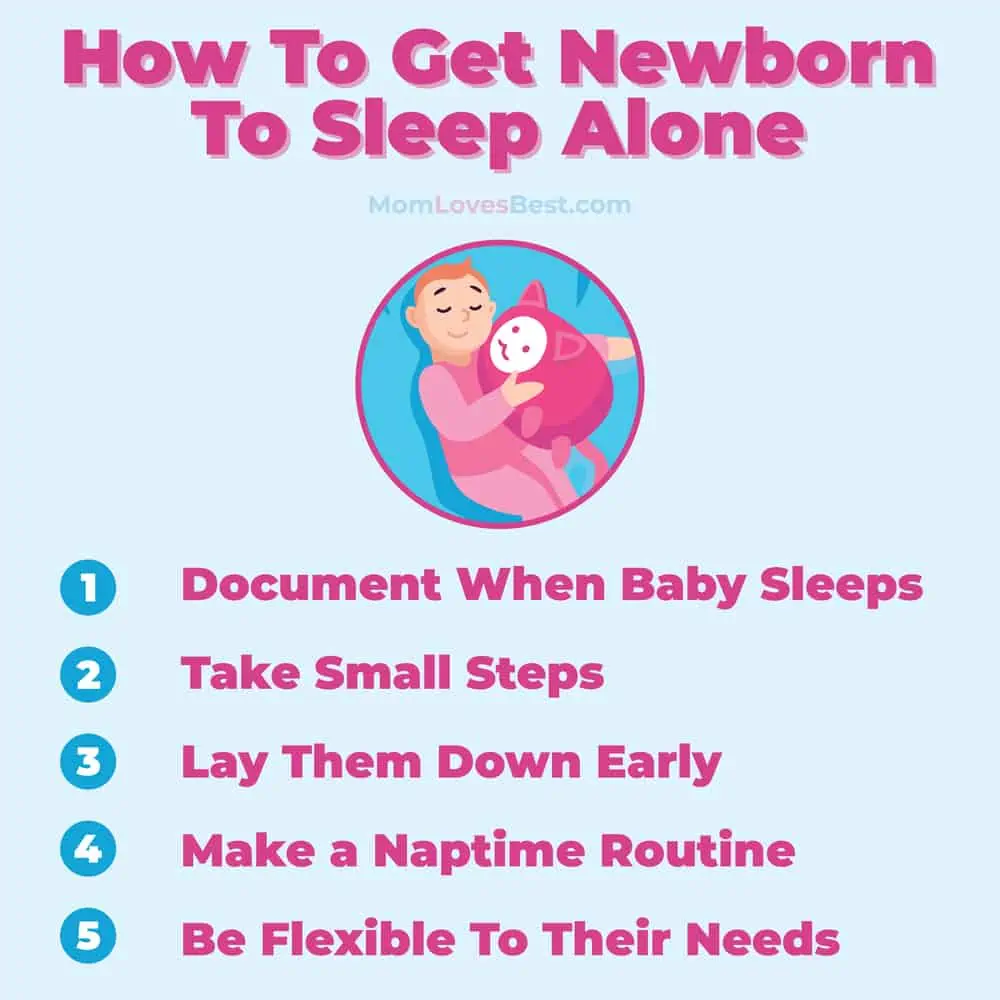Does your newborn fuss and cry at night when you put them down? Are you desperate for an hour to yourself, baby-free, to sleep soundly?
Sleep is one of the biggest struggles new moms face during those first few weeks, and newborns don’t make it easy.
If your newborn won’t sleep alone and demands to be held, cuddled, and rocked all through the night, it can be hard for you to continue functioning. Patience is critical with newborns in every aspect, and nighttime is no different.
In this guide, we will show you how to teach your newborn to sleep alone.
Key Takeaways
- Safe sleep practices, like having your newborn sleep alone, help prevent Sudden Infant Death Syndrome (SIDS).
- Newborns may struggle to sleep alone due to their undeveloped internal clock, hunger, exhaustion, or need for stimulation.
- Establishing a bedtime routine early can help your baby learn to sleep alone over time.
- Be adaptable with your baby’s bedtime routine, as their sleep patterns and needs may change as they grow.
Safe Sleeping For Newborns
Sharing a bed with your baby can be detrimental for various reasons. One is that co-sleeping may be one of the leading causes of sudden infant death syndrome — better known as SIDS. SIDS is what happens when an infant under the age of 1 dies from unknown causes.
Practicing safe sleep practices, including encouraging your baby to sleep alone, is vital in preventing SIDS (1).
Putting your newborn to sleep in their own space, be it a bassinet or a co-sleeper, is essential to the well-being of both of you. Your baby will sleep safe, and you’ll get better quality rest.
When Do Newborns Sleep Through the Night?
Many factors contribute to when your baby is ready to sleep through the night, such as whether they are bottle-fed or breastfed, the kind of sleeper you’ve chosen, or your baby’s temperament.
Every baby is different — some will start sleeping longer earlier, whereas others take their sweet time. Any mother with multiple children can probably confirm this, as sleep patterns even vary between siblings!
Don’t be too discouraged. By six months, most babies will be sleeping for long stretches during the night. And having a solid bedtime routine can help speed this process up (2).
Why Won’t Newborns Sleep Alone?
Newborns can’t communicate their needs or understand the world around them yet — you’re all they know and want. Hungry and tired might be the two default settings of any newborn baby, but your little one is a complex little bundle!
There are many reasons why newborns like being held and rocked to sleep.
Fortunately, understanding why a newborn won’t lay down on their own can be relatively easy to figure out, when you know what to look for.
These are a few of the reasons a newborn may be unable to sleep alone:
- Their internal clock: A baby’s internal clock doesn’t begin to develop until about 12 weeks of age, so trying to get a newborn to understand when to sleep and when to be awake is hard. If they napped too close to bedtime, it could be that they aren’t ready for bed, even if the clock says otherwise (3).
- Exhaustion: Alternatively, if your baby is overtired and hasn’t slept enough, they may have trouble falling asleep.
- Hunger: Breastfeeding moms often feel like they’re constantly feeding, but your baby’s needy behavior could result from a bad latch preventing them from getting enough milk. If your baby is hungry, they may be too uncomfortable to get to sleep.
- Overfed: Tummy aches, acid reflux, and being too full can all be reasons your baby needs to be close to you at bedtime. This is more common for bottle-fed babies.
- Need stimulation: In the womb, a baby is kept warm and secure in a safe environment. They have your heartbeat to keep them company. Placing a baby alone in a big crib can be a shock, and they may need your stimulation to become comfortable.
Understanding your baby’s need for closeness and their inability to sleep alone is a matter of practicing patience and understanding. With trial and error, you can work toward better understanding your baby and their needs.
Helping Your Baby Sleep Alone
Once you’ve determined the likely reasons your baby is stuck to you like glue at night, you can start trying to fix the problem.
Some of the issues are easy to handle. If your baby is overfeeding or taking naps too close to bedtime, all you have to do is adjust their feeding and sleeping schedule to see improvement.
We’ve been there. We know it’s hard when your baby reaches out their bitty arms and cries for attention while all you want is to close your eyes for a few hours. If adjusting their various schedules doesn’t work, it might be time to start looking into sleep training or self-soothing techniques.
[related-spot url=”https://momlovesbest.com/cry-it-out-method”]What Is Sleep Training?
Sleep training refers to the practice of creating a bedtime routine designed to help your baby work on a 24-hour clock, the same way adults and children do. This can help them recognize when it’s time to sleep and when it’s time to be awake.
Sleep training can begin at 4 months old when a baby begins to sleep for longer periods and is not as reliant on constant feeding (4).
When To Introduce a Bedtime Routine
Before beginning sleep training, you’ll want to first work on a bedtime routine.
Routines are great for everyone — babies and parents alike. It never hurts to start working on a bedtime routine, as long as you remember that babies only start developing the ability to follow one around 6-8 weeks (5).
You can start sooner, even when your baby is a newborn! Just be prepared for the routine to be broken frequently for feedings, cuddling sessions, and other speed bumps.
Creating an early routine is more of a loose practice to get yourself, your family, and eventually, your baby into the habit.
How To Get Your Newborn to Sleep Alone
Babies sleep a lot — almost constantly — in their newborn stage. They wake for food, comfort, and diaper changes, then back to dreamland.
Implementing a bedtime routine early won’t affect your newborn immediately, but it can do some good for you to try out which steps work for you and which don’t. It’s also a great way to test your theories on why your baby has trouble sleeping alone.
There are a few steps to establishing a bedtime routine.
1. Document When Your Baby Sleeps
Before rushing into deciding the exact time you want for bedtime, pay attention to your baby and their natural sleep cycle.
This can be pretty sporadic for newborns, but you may notice a pattern in their sleep and when they stay down for the longest. Work with these times, and document them as they change.
2. Take Small Steps
Don’t overload yourself and your baby with ten things you must do before bed each night, especially when your little one is a newborn.
They likely won’t sleep for more than three hours anyway, so take your time and keep it simple. Bring in something new every few days as you feel it’s needed. Don’t be afraid to adjust!
3. Lay Them Down Early
This move takes practice. Before your baby hits a deep sleep, lay them in their sleeper while they’re drowsy and slightly aware. Starting young will help them familiarize themselves with falling asleep alone, and if they’re tired enough, they won’t start crying for your attention.
4. Make a Naptime Routine
Not everything you do before bedtime can be done in the day, but some rituals can. If you enjoy massaging your baby lightly before they sleep, make this a practice before naps, too.
Associating some activities exclusively with sleep can help signal your baby that it’s time to wind down.
5. Be Adaptable
It’s impossible to know what kind of sleeper your newborn will be as they grow, so your routine may need adjusting as your baby grows. Before they’re 4 months old, be flexible to their needs.
It’s hard to know what your baby will respond to when they’re older, so wait until they’ve become better at sleeping before you start enforcing a bedtime routine.










